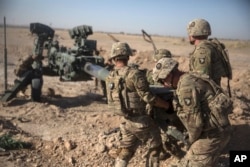The Afghan Taliban's "open letter" to President Donald Trump calling for a total withdrawal of U.S. troops from the country, is aimed at taking pressure off the group as Washington presses Pakistan to crack down on the allied Haqqani terror network, analysts say.
The letter, which was made public Tuesday, comes as Trump continues to cobble together his Afghan policy. There had been strong speculation the policy would be released at the NATO summit in late May, but it has yet to be finalized. U.S. commanders have said the military situation has ground to a "stalemate."
The White House says Trump plans to meet Friday with his security team and Vice President Mike Pence at Camp David to examine the options, which range from a troop surge, as requested by General John Nicholson, commander of U.S. and NATO forces in Afghanistan, to a complete pullout. Other options include turning over the mission to private contractors.
Forced out of power by the U.S.-led invasion of Afghanistan in 2001, the Taliban has remained a destabilizing force in the international effort to foster reconstruction in a country plagued by extremism. The group is an important player that can't be overlooked, but it has failed to come to the negotiating table, instead pursuing attacks and intimidation, while increasing the territory that it holds over the past year.
"If you failed to win the Afghan war with disciplined U.S. and NATO troops, advanced technology, experienced military generals, consecutive strategies and mighty economy, you shall never be able to win it with mercenaries, notorious contractor firms and immoral stooges," said the Taliban letter.
Aimal Faizi, spokesman of former president Hamid Karzai, questioned the Taliban's authority and aims. He said the letter won't make any impact on U.S. strategy.
"On Afghanistan, Washington certainly has long-term plans and strategies," Faizi said." All the president does is choose from the available options to him. Trump is not going to withdraw troops from Afghanistan. So the letter... will not change anything in the White House."
Trump has taken a tougher stance toward terrorism, and his administration has continued pressure on Pakistan to eliminate the Haqqanis. This seems to have pressured the Taliban, and the letter might be a tactic to ease the heat, said Khadim Hussain, a political analyst based in Peshawar.
"It certainly is a tactic to counter the pressure being built on the security establishment of Pakistan," Hussein said.
Sami Yousufzai, a journalist with The Daily Beast, agrees. "In fact, the U.S. nowadays is pumping Pakistan to take solid action against the Haqqnai network," he said."To ease growing pressure, the Taliban have sent a letter to Trump, just to show they are not insane killers, but in reality, the Taliban are preparing for killing and bloodshed in Afghanistan in coming months."
In the seven months since Trump took office, the policy that terrorism must be eradicated, wherever it is, has remained firm.
Sediq Sediqqi, director of the Media and Information Center Afghanistan, tweeted the Taliban and their supporters are trying to sound reasonable because they dread Trump's focus coming fully on them.
"The Taliban and their backers are afraid of him; they know he will be serious and will go after them and their backers," he wrote.
Trump also has shown frustration over the length of the Afghan war, and the country's endemic corruption has caused other frustrations.
According to a report from the U.S. Special Inspector General for the Reconstruction of Afghanistan, territory under the Afghan government's control diminished significantly in 2016 as the Taliban made large gains.
About 8,400 U.S. troops are in Afghanistan, training, advising and assisting local forces under a NATO-led military coalition, in addition to conducting counterterrorism operations.





